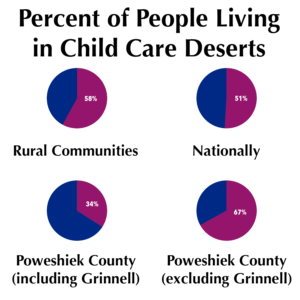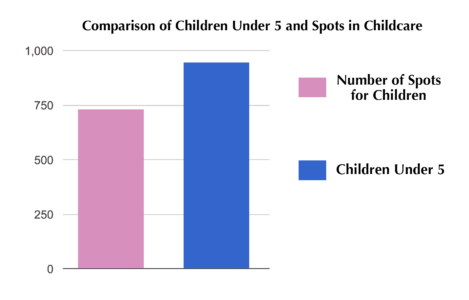
According to an August 2017 report by the Center for American Progress called “Mapping America’s Child Care Deserts,” large tracts of rural Poweshiek County constitute a child care desert, although Grinnell does not. Despite the fact that Grinnell itself is not a child care desert, employers and parents have long been expressing their concerns that Grinnell is lacking in child care options.
According to the Center for American Progress’ definition, a child care desert is defined as an area in which there are more than three children per licensed child care slot. Child care deserts affect waiting lists for child care providers and parents’ employment decisions, as one-third of children under the age of five are cared for by non-relatives and rely on child care.
Grinnell has 392 children under the age of five and 544 potential child care seats, and thus cannot statistically be designated as a child care desert. However, it is surrounded by “desert” in parts of Poweshiek, Tama and Jasper counties. Many of these areas rely on and benefit from Grinnell’s resources.
Rachael Kinnick, Director of the Grinnell Chamber of Commerce, has been hearing from employers that child care has been a concern for as many as 20 years. About two years ago, concerns from Grinnell Mutual surfaced as they examined potential avenues to aid employees who were being affected by a demonstrated lack of child care.

As a response, Kinnick and the Chamber of Commerce, along with Poweshiek Iowa Development (Pow I-80) and Early Childhood Iowa, started meeting a year ago to clarify the issue.
“The reason the Chamber and Pow I-80 are involved is because we were hearing it a lot from our employers that there was a need and a demand for child care in our community,” said Laura Manatt, Executive Director of Pow I-80. “When our group started meeting we had all heard different reasons for why there was a need for daycare, but we didn’t really have any proof to back up our reasoning.”
To understand the needs of the community, this collective will distribute a survey in collaboration with the First Children’s Finance’s Iowa branch. The survey will take three forms: one for employers, one for parents with children under 12 years old and one for people who think they may have or adopt children within the next five to ten years. As a third party group, First Childen’s hopes to fill in the gaps and identify the issues that that are facing parents and employers in Grinnell.
The Chamber of Commerce began circulating the survey on Thursday, March 1, amongst its 270 member businesses. Kinnick wants to ensure that the survey makes its way to as many parents as possible. She encourages those who do not receive it from their employers to seek it out on the Grinnell Chamber of Commerce’s website. The survey will be available through March 15.
“By surveying Grinnell, it gives us a pretty good gauge of where we’re at in the rest of the county in terms of day care,” Manatt said in reference to the extended community dependent on Grinnell’s resources.
“Even if you live in Brooklyn, but work in Grinnell, we want you to take that survey, we want to know what your needs are and how that kind of affects the broader needs,” Kinnick said.
Grinnell currently has only one child care center, Grinnell Community Daycare & Preschool, along with a handful of in-home care providers. If the survey determines that there are not enough seats proportional to children in the extended community, solutions may include an expansion of the existing daycare, the addition of a second daycare center or more opportunities for educating in-home providers.
From the employer’s perspective, “it’s hard to recruit people to a community when you don’t have enough day care,” said Manatt. If there is a lack of child care options, such as drop-in centers, people may have to take time off more frequently to care for their children, or if the options are very limited, they may not be able to work at all.
The question to be addressed, said Kinnick, is whether “a lack of child care [is] preventing people from being in our work force, or preventing our workforce from being as productive as possible?”
The survey will consider the incentives currently being offered by employers in the community, such as flex-spending accounts or scholarships for child care, and whether employers donate to local child care providers for general operating costs.
The solution, whatever it may be, will involve a discussion between the Grinnell Chamber of Commerce, Pow I-80, Early Childhood Iowa and existing child care providers and employers.
“I think collaboratively and collectively having the conversation will help us yield some different results than maybe we’ve had in the past,” Kinnick said, adding that there has been interest from entrepreneurs in opening a for-profit center. This may be aided by Pow I-80’s small community loan fund, which has helped child care providers in the past.
Manatt feels strongly that the community will rally around whatever the cause of the child care issue is determined to be, especially because it is hard to identify an employer who has not expressed concerns.
“From the Chamber’s perspective, this is a really important issue. It affects a lot of our businesses and it affects our community at large. One of the things that we’re hoping is that by addressing the issue we’ll figure out a way to get more potential employees to move to Grinnell, and also more importantly, keep the employees that we have in Grinnell,” Kinnick said, stressing the importance of appropriate child care resources to the community’s potential for economic growth.
The survey will be available until March 15.























































